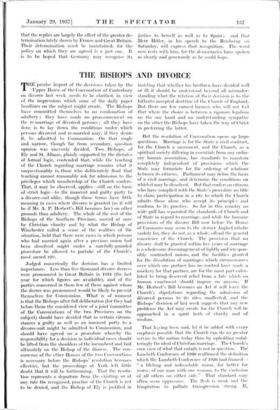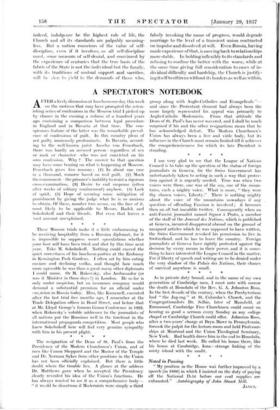THE BISHOPS AND DIVORCE
THE precise import of the decisions taken by the Upper House of the Convocation of Canterbury on divorce last week needs to be clarified, in view of the impressions which some of the daily paper headlines on the subject might create. The Bishops have committed themselves to no condonation of adultery ; they have made no pronouncement on the re-marriage of divorced persons ; all they have done is to lay down the conditions under which persons divorced and re-married may, if they desire it, be admitted to Communion. On that single and narrow, though far from secondary, question opinion was unevenly divided. Two Bishops, of Ely and St. Albans, plainly supported by the dictates of formal logic, contended that, while the teaching of the Cliurch regarding marriage remains what it unquestionably is, those who deliberately flout that teaching cannot reasonably ask for admission to the privileges which membership of the Church confers. That, it may be observed, applies—still on the basis of strict logic—to the innocent and guilty party to a divorce-suit alike, though those terms have little meaning in cases where divorce is granted (as it will be if Mr. A. P. Herbert's Bill becoines law) on other grounds than adultery. The whole of the rest of the Bishops of the Southern Province, moved at once by Christian charity and by what the Bishop of Winchester called a sense of the realities of the situation, held that there were cases in which persons who had .married again after a previous union had been dissolved might under a carefully-guarded procedure be allowed to partake of the Church's most sacred rite.
Judged numerically the decision has a limited importance. Less than five thousand divorce decrees were pronounced in Great Britain in 1934 (the last year for which figures arc available), and of the parties concerned in them few of those against whom the decree was pronounced would be likely to present themselves for Communion. What is of moment is that the Bishops after full deliberation (for they had before-them the considered view of a joint committee of the Convocations of the two Provinces on the subject) should ,have decided that in certain circum- stances a guilty as well as an innocent party to a divorce-suit might be admitted to Communion, and should have agreed on a procedure whereby the responsibility for a decision in individual cases should be lifted from the shoulders of the incumbent and laid ultimately on the Bishop of the diocese. The con- currence of the other Houses of the two ConvocationS is necessary before the Bishops' resolution becomes effective, but the proceedings at York left little doubt that it will be forthcoming. That the resolu- tion represents a departure from the existing, or at any rate the recognised, practice of the Church is not to be denied, and the Bishop of Ely is justified in insisting that whether his brethren have decided well or ill, it should be understood beyond all misunder- standing what the relation of their decision is to the hitherto accepted doctrine of the Church of England. But there are few earnest laymen who will not feel that where the choice is between a rigorous legalism on the one hand and an understanding sympathy on the other the Bishops have taken the way of Christ in preferring the latter.
But the resolution of Convocation opens up large questions. Marriage is for the State a civil contract, for the Church a sacrament, and the Church, as a spiritual society differing in essentials from any ordin- ary human association, has standards to maintain completely independent of provisions which tlie State may formulate for the ordering of relations between its citizens. Parliament may define the basis of a civil marriage, and determine the conditions on which it may be dissolved. But that confers on ei t liens who have complied with the State's procedure no title to claim participation in a rite to which the Church admits those alone who accept its principles and conform to its practice. So far in this country no wide gulf has separated the standards of Church and of State in regard to marriage, and while the humane provisions of the divorce Bill now before the House of Commons may seem to the sterner Anglo-Catholic unduly lax, they do not, as a whole, offend the general conscience of the Church. The provision that no divorce shall be granted within five years of marriage is a wholesome discouragement of lightly and irrespon- sibly contracted unions, and the facilities granted for the dissolution of marriages which circumstances over which one partner haS no control have made a mockery for that partner, are for the most part calcu- lated to bring deserved relief from a fate which no human enactment should impose on anyone. If Mr. Herbert's Bill becomes an Act it will leave the Church's stipulations regarding the admission of divorced persons to its rites unaffected, and the Bishops' decision of last week suggests that any new problems the Act may create for the Church will be approached in a spirit both of charity and of wisdom.
That hrsving been said, let it be added with every emphasis possible that the Church can do no greater service to the nation today than by upholding unfal- teringly thc ideal of Christian marriage. The Church's own view of what that entails is not in question. The Lambeth Conference of 1930 reaffirmed the definition which the Lambeth Conference of 1920 had framed- " a lifelong and indissoluble union, for better for worse, of one man with one woman, to the exclusion of all others on either side." That standard may often seem oppressive. The flesh is weak and the temptation to palliate transgression strong. If, indeed, indulgence be the highest rule of life, the Church and all its standards are palpably meaning- less. But a nation conscious of the value of self- discipline, even if it involves, as all self-discipline must, some measure of self-denial, and convinced by the experience of centuries that the true basis of the fabric of the State is not the individual but the family, with its traditions of mutual support and sacrifice, will be slow to yield to the demands of those who, falsely invoking the name of progress, would degrade marriage to the level of a transient union contracted on impulse and dissolved at will. Even Russia, having made experience of that, is moving back to relationships more stable. In holding inflexibly to its standards and refusing to confuse the better with the worse, while at the same time giving full consideration to cases of in- dividual difficulty and hardship, the Church is justify- ing itself to citizens without its borders as well as within,























































 Previous page
Previous page